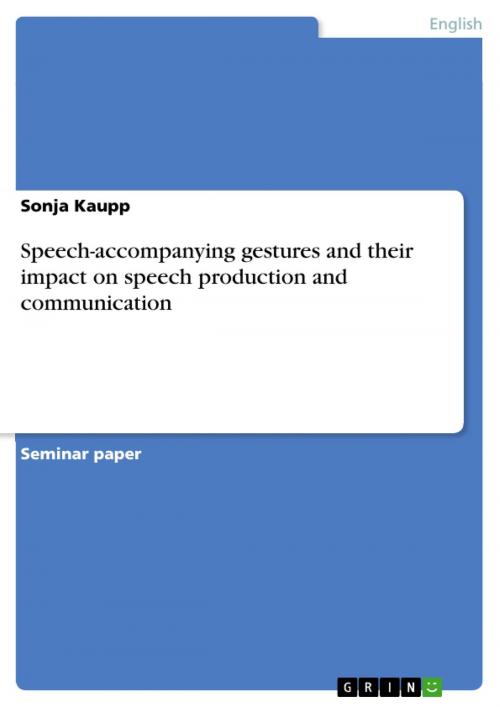Speech-accompanying gestures and their impact on speech production and communication
Nonfiction, Entertainment, Drama, Anthologies| Author: | Sonja Kaupp | ISBN: | 9783656026600 |
| Publisher: | GRIN Publishing | Publication: | October 11, 2011 |
| Imprint: | GRIN Publishing | Language: | English |
| Author: | Sonja Kaupp |
| ISBN: | 9783656026600 |
| Publisher: | GRIN Publishing |
| Publication: | October 11, 2011 |
| Imprint: | GRIN Publishing |
| Language: | English |
Seminar paper from the year 2011 in the subject English Language and Literature Studies - Other, grade: 1,0, University of Freiburg (Englisches Seminar), course: Hauptseminar: Language, Cognition and Interaction, language: English, abstract: Gestures are used by all of us most of the time we talk. But what is so fascinating about them is that they are usually seen as unnecessary by-products, whereas all the necessary information is already encoded in speech. So why do we even bother gesturing? Is it just a reflex that does not serve any function at all or only social functions? Do gestures convey additional information that may be helpful but is not essential? Or are gestures crucial to conversation after all and if so, how? After introducing some basic knowledge about gestures I would like to focus on these questions that are concerned with the communicative functions. However, communication purposes which are mostly associated with gestures are only one part of the picture. There is also a lot of relevant research about the role of gestures in speech production as well and also on their impact on memorising and learning. Hence, I will cover all three approaches which are subdivided into different theories and weigh them up against each other.
Seminar paper from the year 2011 in the subject English Language and Literature Studies - Other, grade: 1,0, University of Freiburg (Englisches Seminar), course: Hauptseminar: Language, Cognition and Interaction, language: English, abstract: Gestures are used by all of us most of the time we talk. But what is so fascinating about them is that they are usually seen as unnecessary by-products, whereas all the necessary information is already encoded in speech. So why do we even bother gesturing? Is it just a reflex that does not serve any function at all or only social functions? Do gestures convey additional information that may be helpful but is not essential? Or are gestures crucial to conversation after all and if so, how? After introducing some basic knowledge about gestures I would like to focus on these questions that are concerned with the communicative functions. However, communication purposes which are mostly associated with gestures are only one part of the picture. There is also a lot of relevant research about the role of gestures in speech production as well and also on their impact on memorising and learning. Hence, I will cover all three approaches which are subdivided into different theories and weigh them up against each other.















